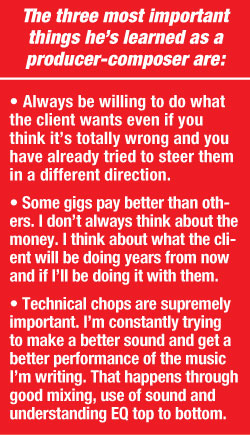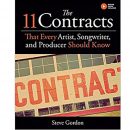
Los Angeles-based composer and producer Jack Wall got his start in Boston as an apprentice in 1988 at Syncro Sound, made famous by the Cars and “Shake It Up.” He soon transitioned into engineering and ultimately into production. In 1996 he was tapped to score a video game, thereby launching the next phase of his career. Wall has also composed for TV, film and runs Lost in Sound, his own label. Games he’s been involved with include Mass Effect, Call of Duty and the Myst series. Artists he’s worked with include Patti Smith and David Byrne. Notably, he had a hand in Michael Jackson’s HIStory.
The challenges of composing for film, TV and video games have some core similarities but of course the specifics vary. “TV and film are similar,” Wall explains. “I go to a spotting session, watch the show or movie and figure out where the music belongs. Then I go back to my studio and start writing. Video games are different. We spend a lot of time digging into what it’s going to be because we can’t see much in the beginning. It’s a longer process. We usually have a year. But I’m not working on it all the time. It’s in fits and starts as the production develops.
“I’ll see a level [of a game] and it’ll be due in two months,” Wall continues. “Half of the battle of scoring is putting it in the game and making it work, whereas TV and film, you lay it in and know right away if it’s going to work. One of the challenges is that sometimes you’re writing music for a scenario that you may not see. Sometimes I’ll rejigger a piece to make it fit more into what’s going on, once I do see it. I help drive the story and the linear pathway through that experience. We have to get into the heads of the players: what will they do and when will they do it? Often I have to create a few different musical options as the story unfolds.”
 Wall has learned that his is very much a service business. “It doesn’t matter what you’re doing—it’s all about servicing your client,” he observes. “You can be a mediocre composer but if the client gets what they need on time and on budget, they’ll come back for more. That’s as important as how effective you are at composing. Taking care of your clients and seeing that they’re satisfied is the secret to success in this business.”
Wall has learned that his is very much a service business. “It doesn’t matter what you’re doing—it’s all about servicing your client,” he observes. “You can be a mediocre composer but if the client gets what they need on time and on budget, they’ll come back for more. That’s as important as how effective you are at composing. Taking care of your clients and seeing that they’re satisfied is the secret to success in this business.”
To composers and producers new to the business, he says that it’s important to be able to survive the early years of a career. “You have to find a way in that’s unique to you,” he advises. “There’s no one way to do it. You have to be open to different paths. If you’re not passionate about doing this, then don’t do it. Because other people in the field are.”
Recently Wall finished scoring a TV show and a movie. He’s on the verge of beginning the score for a new video game, the name of which he has to keep under wraps for now. He’s also working on an album done to sell music into film trailers as well as other projects that he can’t discuss due to non-disclosure agreements. But to summarize, his short and long-term future both promise to be busy.
By Rob Putnam
Contact Greg O’Connor-Read / Top Dollar PR, 702-407-0935,
greg@topdollarpr.com; http://jackwall.net









